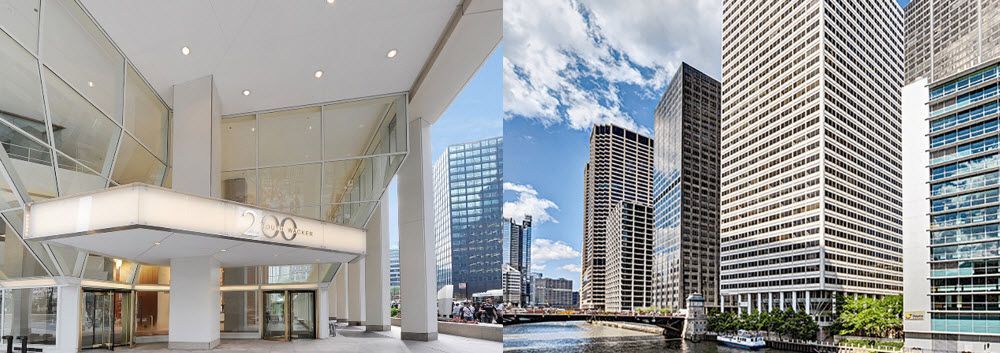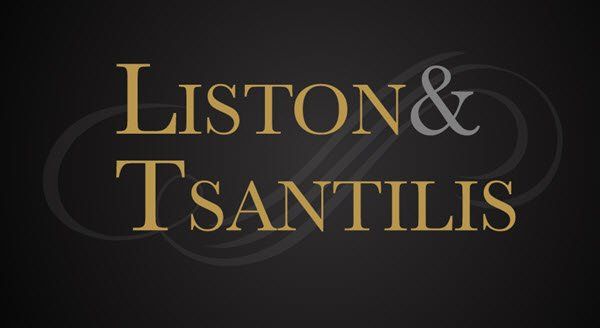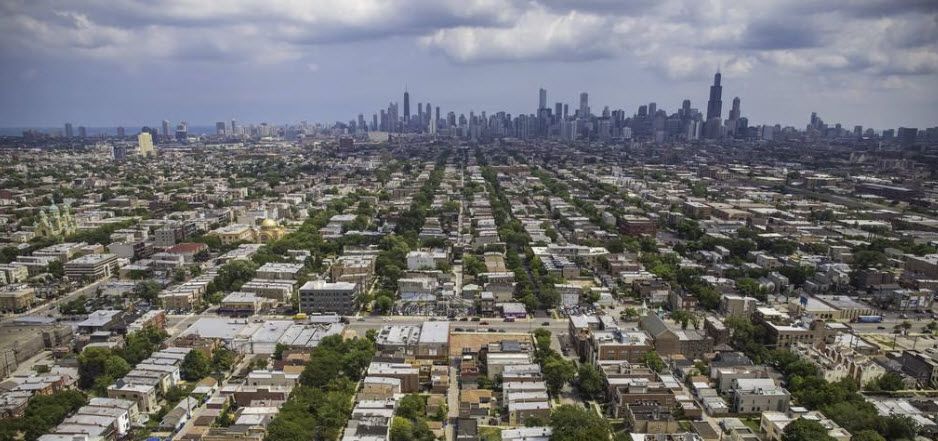Peter Tsantilis Interviews Ward Fitzgerald, CEO Exeter Property Group, at Bisnow National Industrial and Logistics Midwest Summit
Kevin McKeown • August 7, 2018

Source: BISNOW | Repost Liston & Tsantilis 4/9/2025 - With tax season in full swing, the commercial real estate industry is focused on how to get the most out of any tax incentives available. In Cook County, Illinois, this includes the Class 6b incentive , which was created to encourage the development of new industrial facilities, the rehabilitation of existing industrial structures and the industrial reutilization of abandoned buildings. Properties that qualify for this incentive will be assessed at 10% of market value for the first 10 years, 15% in the 11th year and 20% in the 12th year, resulting in significant tax savings. Qualifying properties can receive a reduced assessment from the date that new construction or substantial rehabilitation is completed and initially assessed or, in the case of abandoned property, from the date when it is occupied by new tenants. According to the 6b eligibility bulletin published by the Cook County assessor, the goal of this incentive is “to attract new industry, stimulate expansion and retention of existing industry and increase employment opportunities.” Brian Liston and Peter Tsantilis of the Chicago-based law firm Liston & Tsantilis have a personal history with this incentive. Four decades ago, while working in the Illinois Attorney General’s Office, Liston helped draft several key property tax incentives with Cook County President George Dunne, including 6b. Years later, Liston and Tsantilis were instrumental in drafting the legislation that allowed industrial owners to renew this incentive. Tsantilis, reflecting on the changes that have been made to the incentive since its inception, explained that initially, a building needed to be vacant for two years to qualify. That term was then shortened to less than two years, then less than one year under the special circumstances arm of the incentive — if there is a transfer of title. Otherwise, with no transfer of title, there must be at least one year of vacancy. “Several different variations have been developed over the years based on the needs of property owners and tenants,” Tsantilis said. Read the full article...

We are excited to announce a new chapter for Liston & Tsantilis ! Thanks to your continued support and the growth we’ve achieved together, we are expanding into a new, larger space that will enable us to ensure the best possible technological advances in our industry. As of November 1, 2024, our new office will be located at: 200 S. Wacker Drive Suite 820 Chicago, Illinois 60606 This move reflects our continued commitment to excellence by creating a space that accommodates the ever evolving and increasing technological demands necessary to lead the new frontier of land use and valuation services. If you have any questions or need more information, feel free to contact us. Thank you for being an essential part of our journey! Warm regards, Brian, Peter & the Team at Liston & Tsantilis

We are thrilled to share some exciting news with you! Thanks to your continued support and our collective success, we are embarking on a significant new chapter at Liston & Tsantilis . Due to our sustained growth, we are expanding into a new, larger space that will allow us to better serve you as we continue our journey. Our new location will be at 200 S. Wacker, a move that reflects our commitment to providing the highest quality of service and technology in order to accommodate the evolving needs of our clients and partners. This expansion is more than just a change of address; it is a testament to the strong relationships we have built with you and the bright future we envision. As you can see, construction is about to begin and we are planning to transition to the new space upon its completion. We will keep you updated on our progress and any relevant details as the project advances. Rest assured, throughout this process, our focus remains on maintaining and exceeding the excellent level of service you have come to expect from us. Thank you for being an integral part of our journey. We look forward to welcoming you to our new location and continuing our successful partnership. Should you have any questions or need further information, please feel free to reach out. Warm regards, Brian & Peter

Source: Illinois Revenue | Repost Kistin Tsantilis 5/21/2024 - A final 2023 property tax equalization factor of 3.0163 for Cook County was just announced by the Illinois Department of Revenue. The Department is required by law to calculate the factor, often called the multiplier, to achieve uniform property assessment throughout the state. The Department determines the equalization factor for each county by comparing a three-year period the actual selling price of individual properties to the assessed value placed on those properties by the county assessor. If the median level of assessment for all property in the county varies from the 33 1/3 percent level required by law, an equalization factor is assigned to bring assessments to the legally mandated level. The three-year average level of assessments (weighted by class) for Cook County property is 11.05 percent. The Department calculated the multiplier to bring the average level of assessments to the required 33 1/3 percent level by dividing Cook County's three-year average of 11.05 into 33.33. After taking into account the reassessments, the levels of assessment are as follows: After taking into account the 2023 reassessments, the levels of assessment are as follows: Class Average 2020 2021 2022 3-Year 1 (Vacant Lots) 7.57% 7.88% 6.76% 7.40% 2 (Residential) 9.86% 9.05% 8.16% 9.02% 3 (Apartments) 8.41% 7.21% 6.59% 7.40% 5a (Commercial) 24.53% 23.54% 20.59% 22.89% 5b (Industrial) 26.14% 24.59% 19.05% 23.26% COUNTYWIDE 12.08% 11.12% 9.94% 11.05% (weighted average) The equalization factor does not cause individual tax bills to go up. Tax bills are determined by local taxing bodies when they request the dollars needed to provide services to citizens. The assessment process simply determines how the bill will be divided among taxpayers. A Cook County ordinance requires that residential property (homes, condominiums, apartment buildings of six units or less) be assessed at 10 percent of market value; all other residential property (apartments with more than six units), 10 percent; vacant lots, 10 percent; property owned by not-for-profit corporations, 25 percent; commercial property, 25 percent; industrial property, 25 percent; and commercial or industrial property being developed in economically deprived areas, usually 10 percent. Official Announcement:

Navigating the evolving landscape of property tax incentives in Cook County, Illinois has become an increasingly complex task for business leaders aiming to optimize their real estate investments. Liston & Tsantilis has been at the forefront of property tax incentives for industrial and commercial properties for the last 40 years. In this article, we offer the recent incentives updates and insights into the significant changes that have recently unfolded in the realm of commercial and industrial property incentives. Understanding their implications is essential as real professionals move their businesses forward against the never-ending changes taking place. Brian & Peter Source: Bisnow | Reposted Liston & Tsantillis 4/1/2024 - Nearly four decades ago, attorney Brian Liston worked as an assistant at the Illinois Attorney General’s office, playing a key role in drafting Cook County incentives ordinances to boost the local economy and attract new businesses. “I worked in a team alongside the Cook County Assessor Thomas Tully and Cook County President George Dunne to implement tax incentives to compete with the surrounding counties’ to lower assessment classifications, instill economic development and create jobs,” Liston said. “As Jerry Garcia of the Grateful Dead would say, ‘It’s been a long, strange trip.’” Today, Liston is a partner alongside Peter Tsantilis at the Chicago-based Liston & Tsantilis, a law firm that specializes in eminent domain litigation, property tax litigation and incentives for industrial and commercial properties. His law firm has consistently been ranked No. 1 for the past 19 years by the Leading Lawyers Network . In the decades since Liston helped shape those incentives, a lot has changed. And those changes seemed to speed up significantly in the last few years amid the changing real estate landscape. “There have been significant changes in the last 36 months that we need to update the real estate community on to ensure they have all the necessary and accurate information they need to make informed decisions when it comes to incentives,” he said. Liston and Tsantilis walked Bisnow through the major changes of the last four years and what they mean for the commercial and industrial real estate communities. Read the full article...

The Bring Chicago Home Proposal Would Quadruple the Real Estate Transfer Tax. The proposed three-tiered system discourages global investment by increasing transfer taxes on properties valued at $1 million and above. While transfer tax on properties under $1 million will decrease slightly from .75% to .6%, properties over $1 million will see significant increases in the midst of market turmoil:

Source: Illinois Revenue | Repost Liston & Tsantilis 9/6/2023 - A final 2022 property tax equalization factor of 2.9237 for Cook County was announced today by the Illinois Department of Revenue. The Department is required by law to calculate the factor, often called the multiplier, to achieve uniform property assessment throughout the state. The 2022 Final equalization factor increased from the 2022 tentative factor of 2.7230.The department determines the equalization factor for each county by comparing over a three-year period the actual selling price of individual properties to the assessed value placed on those properties by the county assessor. If the median level of assessment for all property in the county varies from the 33 1/3 percent level required by law, an equalization factor is assigned to bring assessments to the legally mandated level. The three-year average level of assessments (weighted by class) for Cook County property is 11.40 percent. The department calculated the multiplier to bring the average level of assessments to the required 33 1/3 percent level by dividing Cook County's three-year average of 11.40 into 33.33. After taking into account the 2022 reassessments, the levels of assessment are as follows: 3-Year Class 2019 2020 2021 Average 1 (Vacant Lots) 9.38 7.34 7.65 8.12 2 (Residential) 9.52 9.37 8.60 9.16 3 (Apartments) 7.24 8.65 7.42 7.77 5a (Commercial) 22.76 24.79 23.78 23.78 5b (Industrial) 27.27 25.38 23.88 25.51 COUNTYWIDE 11.64 11.74 10.81 11.40 (weighted average) The equalization factor does not cause individual tax bills to go up. Tax bills are determined by local taxing bodies when they request the dollars needed to provide services to citizens. The assessment process simply determines how the bill will be divided among taxpayers. A Cook County ordinance requires that residential property (homes, condominiums, apartment buildings of six units or less) be assessed at 10 percent of market value; all other residential property (apartments with more than six units), 10 percent; vacant lots, 10 percent; property owned by not-for-profit corporations, 25 percent; commercial property, 25 percent; industrial property, 25 percent; and commercial or industrial property being developed in economically deprived areas, usually 10 percent. Official Announcement:

On Wednesday, July 19th, Cook County Board President Toni Preckwinkle announced that the second installment of the property tax bills for the 2022 tax year should be ready by November 1st and due December 1st. The article below from the Chicago Tribune has the details of the announcement. We will continue to monitor the situation and provide updates as we are made aware of them. Brian & Peter Source: Chicago Tribune | Repost Liston & Tsantilis 7/20/2023 - Property tax bills owed by Cook County residents and business owners are once again landing in mailboxes months later than usual. Cook County Board President Toni Preckwinkle announced Wednesday that second installment property tax bills for the 2022 tax year are expected to be ready Nov. 1 and due Dec. 1. It’s an improvement compared to last year’s delay: Bills were not ready until late November and were due by Dec. 31. The year before, second installment bills were due two months later than usual. For most of the previous decade, second installment bills have usually been mailed in July and due by Aug. 1. But technological issues between Assessor Fritz Kaegi’s office and the three-member Board of Review, which hears assessment appeals, proliferated during the COVID-19 pandemic, leading to a monthslong delay and weeks of finger-pointing between Kaegi and BOR Commissioner Larry Rogers Jr. Read the full article...

Live Webcast Wednesday, January 25, 2023 CLE – 9:00 a.m. – 1:00 p.m. Virtual Networking – 1:00 – 1:15 p.m. 3.75 hours MCLE credit Whether it’s the State, Cook County, or the City of Chicago – our elected officials decide how taxes are collected, how they are distributed, how (and who) they help, and how to achieve equitable burden and distribution while ensuring the maximum collection and compliance. Join us for an in-depth look at how the laws and ordinances in our tax system operate, as well as how they impact you and your clients. Brian Liston will presenting on Tax Incentives Today as part of the overall event. Topics include: Valuation issues for condominium/townhouse association assessments, as well as the pitfalls, remedies, and existing laws to be aware of; What to expect from Illinois legislative as we enter the Spring 2023 session; An introduction to the Cook County property tax system; and What has changed (and stayed the same) with property tax incentives. Here is the flyer with the complete schedule for the event!

